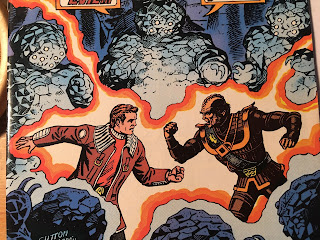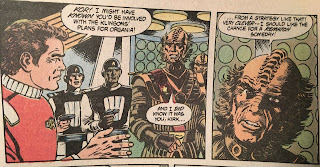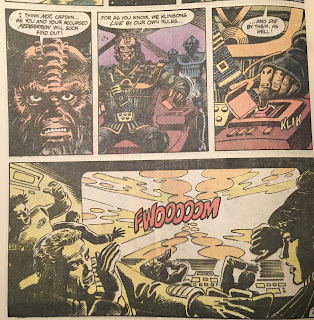I've been lugging these around for years:

but have never read them. Since I'll be moving sometime - somewhere - in the hopefully not too distant future, I decided the time was right to finally take the plunge.
I read the first dozen or so issues on my friend Liz's suggestion back in the day. She was shocked that I was into Star Trek and comics but for some reason wasn't reading the comics. Which was kind of weird, I guess, except I took all cues from my older brother, and he never liked the Trek comics (Marvel/ Gold Key.) Liz has come up before in my Trek McReverie; outside my parents, she was the person primarily responsible for my subsequent Trek fandom.
For years I've had a memory of reading some kind of Saavik origin-story that I'd convinced myself must've been in the novelization of either Star Trek II or III. I do remember a romance between Saavik and David Marcus, for example, that was cut out of TSFS but left in the novelization. But years back when I was doing the original Captain's Log series I re-read both and nope, no origin story. It took until the far future of 2021 to realize what I've been half-remembering all this time is "The Origin of Saavik" arc in these DC Trek comics (issues 7 and 8.) Long-time mystery solved. Ain't worth a thimbleful of Sehlat spit for anyone else, but that's the kind of "mystery solved" I personally live for with these blogging projects.
Anyway, it's time to read these damn things and determine their ongoing presence in the McMolo Archives. I don't know how often these'll come together and apologize in advance for any screencaps-blurriness. These are all 'caps I'll be taking from my phone, sending to myself, and editing in Paint.
 |
| Okay let's jump in. |
DC's Trek, vol 1, came out after The Wrath of Khan and took off from there. I'm always intrigued by that sort of thing, which goes back to leafing through my brother's Star Wars comics sometime after The Empire Strikes Back came out, when they had a storyline that picked up right where the last frame of that movie ended. It's such a unique angle, sideways-specific to a time and place that no longer matters i.e. whatever you imagine happening after The Empire Strikes Back or The Wrath of Khan has been rendered moot by the appearance of The Return of the Jedi and The Search for Spock.
It began pre-Crisis and continued post-Crisis, making it one of a handful of DC titles to survive the 80s without getting caught up in any of that. All the odder considering DC's Trek editor was Marv Wolfman, Crisis co-author, whose edict to writer Mike W. Barr (author of the Trek book Gemini and others) think comic books, not television. Comic book pacing, comic book logic, etc. The balance to strike is important. Characters based on actors have to have their likeness approved over and over again which always handicaps the illustrator, I think, but both Tom Sutton (as inked by Ricardo Villagran) and Mike Barr do a good job of wedding the Trek-verse to the logic of the comics page. (Without going full-on Gold Key about it.)


David and Carol Marcus have returned to Regula One, the Enterprise has returned to Earth, and Admiral Kirk has convinced the brass to let him take over the ship permanently. This is all established effectively within the first couple of pages. Saavik is Science Officer, and the regular crew (minus Spock of course) is joined by Ensigns Bryce and Bearclaw (I know), who both had relatives on the Gallant.
They seemed to be setting up a deeper dynamic, here, than they ever get back to. But we shall see where all of this goes.
 |
| This slap leads to a big officer's brawl reminiscent and a dressing down from the Admiral. I keep waiting for the series to return to it, but so far (I'm in the upper teens, at press time) nada. |
The first four issues serve as sequels to both “Errand of Mercy” and “The Savage Curtain.” Klingon ships are appearing out of nowhere and attacking Federation vessels, including the USS Gallant, whose destruction at the hands of Koloth (yes, that Koloth) opens the issue. Koloth (along with Kor, who appears soon after) yearns to redress TOS-era grievances but is prevented from doing so by the Organian Peace Treaty.
The Klingons have gotten around the treaty by placing their station in a wormhole, which Kirk and Bryce discover in TMP-style good old fashioned personal-space-exploration.
They destroy the station but are confused: why would this scheme work? Surely beings such as the Organians wouldn't be tricked?
When they emerge, they discover Admiral Turner (of the Federation) and Kahless IV (emperor of the Klingon Empire) have declared war on one another. Kirk's suspicions of what he's seeing and hearing deepen when he sees a Federation propaganda reel detailing atrocities.
Against regulations, (of course) Kirk sets course for Organia to see what the devil is going on. Upon arrival they discover the planet has been encased in some kind of energy-absorbent black field. The Klingons appear and attack. The Enterprise successfully fends them off and beams over the survivors of their destroyed ship. It's Kor!
 |
| Replete with lobster-head re-design. Oh, I forgot to mention what happened to Koloth. |
 |
| K'plagh. |
Also joining the crew is Komon, the sensitive, anti-war Klingon, whom Bryce takes a shine to. Kor banishes him to stay on the Enterprise for his abnormal aversion to slaughter. It used to be a cliche among anti-Wolfman readers (and there were plenty of them in the comic-nerd circles in which I ran in the late 80s) that he introduced an annoyingly "sensitive" (think Phil Donahue, dropped into the Justice League, or moving next door to Spider-Man, etc.) character in every book he worked on, Terry Long being the pertinent example from New Teen Titans. (Who even marries Donna Troy!) Konom has the feel of such a set-up, but I kind of like the idea of a peacenik Klingon. Anyway: he'll be around for awhile; I forgot to get a screencap (well, "screencap") of him this time.
The Klingons and Enterprise crew go back and forth until Kor and Kirk can team up, "Day of the Dove" style to fight their common enemy, manipulating their civilizations into apocalyptic war. They penetrate the black field and discover: the Excalbians! Specifically, Yarmek, Kirk's old friend from "The Savage Curtain."
 |
| Kirk tries to warn him about the whole bare-knuckled punch against a creature of molten rock. |
 |
| To no avail. |
Unsatisfied with the results of the good vs. evil contest of "TSC" (and apparently distrustful of the results of fellow season-3-testtakers the Vians, who surely published the results of their findings somewhere) the Excalbians decided first to imprison the Organians, then to pit the Federation and Klingon Empire against each other, for a better study. Kirk tricks the normally passive Organians into action by stressing the violence of the Excalbians actions, against themselves and the galaxy itself. The Organians remove their sanctions against Klingon/ Federation war-making, which has the ironic effect of ending the present conflict and lock themselves in extra-dimensional combat with the Excalbians. As they grow to planet-sized stature and then gradually disappear, the Enterprise escapes, and it's Mister Sulu, ahead Warp Factor One. The End.

Not a bad beginning! Mike W. Barr and Marv Wolfman are both first-gen TOS watchers, and it shows. The crew acts as you think they would if the cameras kept rolling after Spock's death. Kirk gets the traditional “you’re pushing too hard” speech from Bones, and Bones at least wonders what it was Spock wanted him to remember at the end of Wrath of Khan. Tom Sutton's art is at times hampered by tracing a face or posture from TWOK stills or elsewhere, but for the most part this feels and flows like a comic book and not screencaps transcribed awkwardly from another medium.
LEFTOVER SCREENCAPS
I don't feel like saying "screencaps" in air quotes everytime I use the term. You know what I mean.
Not too many this time:
 |
| I love this panel. |
 |
| Did anyone ever have this? I remember the ads but never the figures. |
 |
| Trekkies of Future Past. |
We'll be back with a look at Star Trek #s 5 and 6 at some time in the near-ish future.

































































